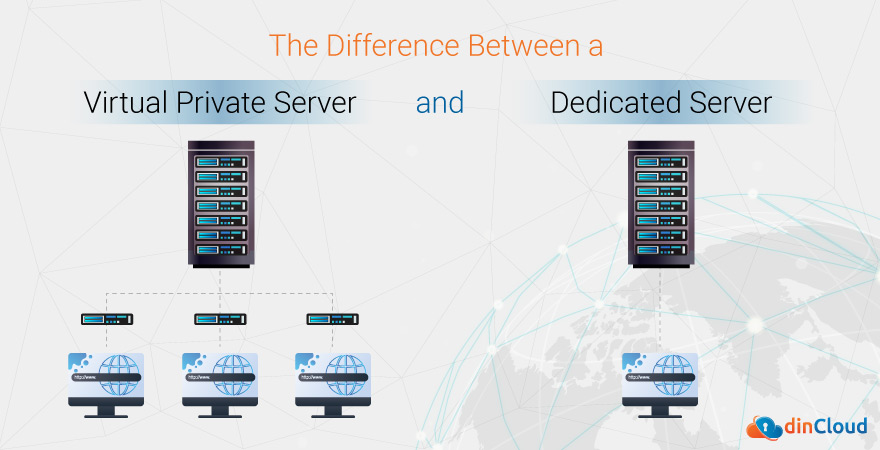In the present day and age, a strong digital presence of your business is very important. As soon as your business starts gaining more traction among customers, the traffic to your website, or any other digital channels can increase very steeply. This is just about the time when as a business, you need to start exploring the various hosting options out there. For a person with no IT background, prospecting for the right type of server can be tedious and costly as well. In this post, we will highlight some of the major differences between a Virtual Private Server (VPS) and a dedicated server. We will also discuss which option is better in which use case scenario.  Related: Why Choose VPS or Virtual Private Server Hosting?
Related: Why Choose VPS or Virtual Private Server Hosting?
Virtual Private Server (VPS)
As the name suggests to some extent, you will get dedicated server resources such as RAM, CPU and Storage in the case of VPS. However, a VPS comes with a caveat, which is that these resources are not dedicated in the literal sense of the word. To make a VPS, what happens is that your hosting provider will split a single powerful physical server into smaller bits and pieces. This does not happen with the physical hardware components of the server, rather its done through virtualization. In between the physical components of the server, and the users which will get dedicated resources, there also lies a hypervisor layer. The main job of the hypervisor is to create independent and dedicated segments of a single large server. A VPS setup delivers the bare minimum performance which has been promised by the VPS provider. Another good thing about a VPS is that in case you experience a sudden spike in demand, which is more than your allotted quota, the hypervisor may come to your rescue. Related: Does Hosting Accounting Apps in the Cloud Actually Help? This is possible only if there is idle capacity / resources available at the level of the actual server, over which the VPS has been provisioned. However, this “assistance” in resources is only subject to availability / idle capacity. A VPS costs lesser as compared to a dedicated server, but delivers the bare minimum performance that has been agreed at the time of provisioning the server. Now, let us move on to the dedicated server concept.
Dedicated Server
In the case of a dedicated server, you can avail the entire set of resources that are available over such a server. You can consider this as an exclusive server, which in turn delivers a much better response time and end user experience. Related: Desktop as a Service – 4 Reasons Why Organizations Embrace DaaS It is the choice of the deploying entity whether to keep the dedicated server on-site, or engage a service provider for managing the various aspects of the server. However, this maintenance bit carries additional costs. So, not only is a dedicated server costly to provision, but it is also costly to maintain over the long run. So far as the cost component is concerned, a dedicated server is a much costlier option, and should be provisioned only if it can justify the higher cost. The obvious upsides of a dedicated server include top notch, superior performance. This better performance is due to the availability of dedicated resources, which are not being shared by any other entity or organization. In the case of a dedicated server, the deploying enterprise also enjoys full control over elements such as the operating system (OS), software, patching and security protocols. However, managing all this requires extra time, and dedicated resources. Related: dinCloud’s DaaS Desktop as a Service Benefits
Conclusion
By highlighting the differences between a Virtual Private Server (VPS) and a dedicated server, we have made it easier for our valuable users to make a decision in favor of the either. At the end of the day, this choice will vary on a case to case basis. If you would like a Virtual Private Cloud Server for your enterprise needs, dinCloud has a wide range of such solutions that are secure, reliable and compliant.


